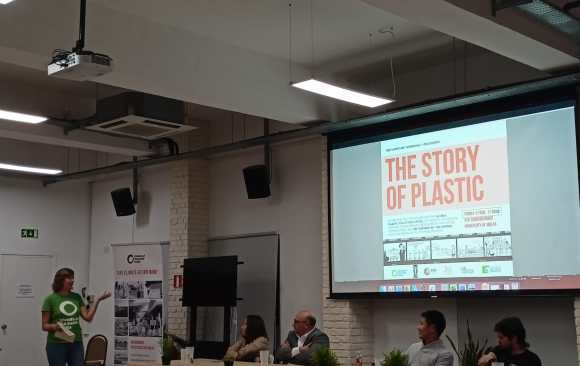Friends of the Earth Malta have been invited to participate in the Art@Climate2030 project by Doing Good. This exciting initiative aims to bring attention to the climate crisis through vibrant murals across the globe. Currently, we are looking for potential wall spaces to place the climate artwork. Here's what we're searching for:
Fossil Free Malta

What is our vision?
The burning of coal, oil, and gas, as well as other human practices such as intensive agriculture and deforestation contribute to the generation of excessive greenhouse gases that pollute the atmosphere and lead to climate change impacts across the globe. Not only is climate change posing significant environmental issues, but it is increasing social inequality within and between countries.
We need to move away from fossil fuels – oil, coal and gas – as soon as possible. New fossil fuel infrastructure is incompatible with global, EU, and national carbon emission reduction targets. The proposed Melita gas pipeline would lock Malta into a fossil fuel future. We need to ensure that any public investment is compatible with climate targets, and avoid funding any new fossil fuel infrastructure at all costs.
Our country should prepare for a climate proof future and move away from fossil fuels as fast as possible. We need to ensure there is a plan for a gas phase-out by 2035 latest. In the short term, we need a new Renewable Energy Policy, outlining the pathway to zero emissions and clean renewable energy for the Maltese Islands.

5 reasons to stop using gas as a fuel
Today, Malta’s energy demands are primarily met through the use of gas-fired turbines using liquefied natural gas (LNG), a polluting fossil fuel. It’s imported to Malta via marine carriers, which involves considerable energy for its transport and contributes to significant greenhouse gas emissions throughout its lifecycle.
Swipe the carousel to find out more about pitfalls of using gas:
A gas pipeline to Malta?
We need to move away from fossil fuels as soon as possible. New fossil fuel infrastructure is incompatible with global, EU, and national carbon emission reduction targets. This includes the proposed Melita gas pipeline, which would lock Malta into a fossil fuel future! We should invest in the energy of the future, not of the past!
Watch the video below to learn more about the proposed Melita gas pipeline, and why we should push for investment in renewables, energy savings and community energy instead.
5 Reasons Why Hydrogen Is Not a Green Fuel
Since the EU will not finance purely fossil fuel infrastructure any longer, the Melita TransGas Pipeline was rebranded as a ‘hydrogen-ready’ pipeline. However, experts state it is not that straightforward to make gas infrastructure suitable for hydrogen transport. It is a much smaller molecule and needs at least 3 times more energy to be transported through a pipeline, as well as posing greater risks for leakages. We need to ensure that hydrogen is not used as a veil to greenwash the fossil gas pipeline project.
While hydrogen may be presented as a type of ‘green’ energy, currently 99% of hydrogen is produced from fossil fuels. The main type of hydrogen available today, ‘grey’ hydrogen, is created via steam-reforming from gas or coal – yes, fossil fuels! ‘Blue’ hydrogen is based on the same process as ‘grey’, but includes carbon capture and storage (CCS) mechanisms to reduce carbon emissions, which have yet to be proven to work.
Swipe the carousel to find out why hydrogen is not a green fuel at all:

Climate publications
News

5 reasons to get involved in a community energy project
Community energy is what we stand for: citizen owned renewable energy projects that democratize our energy system. Together with the...

Tell us what you think about micromobility!
The project is aimed to develop skills and raise awareness on the topic of micromobility, smallhuman or electric powered mobility devices suitable for short urban trips.

Podcast about community energy
Our Climate Campaign Coordinator, Suzanne Maas, recently had a discussion with Ganado Advocates on their podcast ‘Ganado Meets Green Finance.’...

Primary School Teacher Online Workshop
As some of you know, we have been working with different primary teachers in Malta to bring environmental education closer to the younger generations. To do so, we have developed a Toolkit with practical resources for primary school teachers, in order to give them the tools to implement practical environmental activities within the school curriculum.

MICROMOBI
The project is aimed to develop skills and raise awareness on the topic of micromobility, smallhuman or electric powered mobility devices suitable for short urban trips.

CALM-EY project
The project will develop knowledge for specialists working with youth on climate worry and its mental and social effects, providing the necessary tools to recognise climate-related anxiety and distress in young people and help them manage and alleviate it.

5 Reasons Why Hydrogen Is Not a Green Fuel
Since the EU will not finance purely fossil fuel infrastructure any longer, the Melita TransGas Pipeline was rebranded as a...

Join the global climate action day in Malta!
In the first weeks of December, world leaders have come together once again to discuss climate action at the global...

The Plastic Crisis: Top priority now is to turn off the tap
Nearly 50 participants delved into the real Story of Plastics, discussing fears, hopes, and actions essential for addressing the plastic...

FoEM response to the Air Quality Plan published by ERA
Overall, we are glad to see the development of this Air Quality Plan for a main urbanized area of Malta...


















